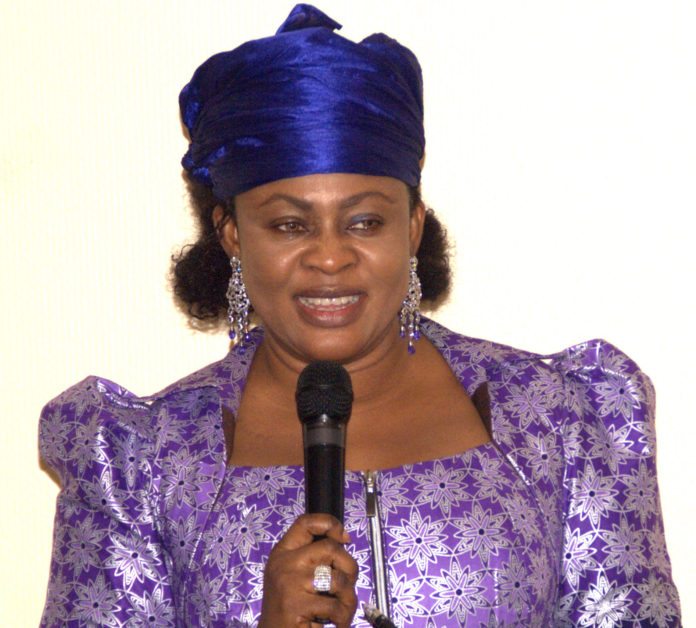By Emeka Alex Duru
Barring any sudden developments, in June when the Ninth National Assembly will be inaugurated, Seven females will be among the 109 Senators. They were among the 232 female politicians that ran for the upper law making house in the February 23 presidential and national assembly elections.
In a curious coincidence, the figure tallies with the number of female senators currently in the eighth Assembly. Eight female senators had actually been elected in 2015 but with the loss of Uche Ekwunife to Victor Umeh at the tribunal, the number came down to seven.
The seven who are going to shape the Ninth Senate are; Oluremi Tinubu, (Lagos Central, APC); Uche Ekwunife, (Anambra Central, PDP); Stella Oduah, (Anambra North, PDP); Akon, Eyakanyi, (Akwa Ibom South, PDP); Aishatu Ahmed, (Adamawa Central, APC); Rose Oko, (Cross River, North, PDP), and Betty Apiafi, (Rivers West, PDP).
They have had varying experiences in their callings, either in the legislature or executive arms of government in their various states. Tinubu, Oduah, Oko and Ekwunife, are, for instance, not new to the red chambers. Oko, before going to the senate seen action in the Federal House of Representatives, alongside Ekwunife and Apiafi. Eyakenyi comes from the executive arm, having been a minister at a time.
Remi Tinubu
Senator Tinubu, the wife of APC National Leader, Asiwaju Bola Ahmed Tinubu, will be serving her third term in the Upper Chamber. She was first elected into the Senate in 2011, as replacement for Senator Olorunibe Mamora, erstwhile speaker of the Lagos house of assembly, on the plank of the Action Congress of Nigeria, ACN. Again in 2015, she re-contested and also won the seat for Lagos Central on the platform of the APC, a feat she repeated at the last election.
Stella Oduah
Oduah, a former minister of Aviation, is one of the three female senators that got re-elected, as Tinubu and Oko. She won the Anambra North senatorial seat for the first time in 2015 and repeated the feat in the February 23 poll. Going for the post had at various times seen her switching camps between PDP and APGA. Her eventual return to the PDP in the run-up to the election, paid off for her.
Rose Oko
Oko was a member of the House of Representatives representing Yala/Ogoja Federal Constituency in 2011 on the platform of the PDP. She was deputy chairman House Committee on Education. She was elected a senator representing Cross River North in 2015 and retained the position at the last poll.
Uche Ekwunife
The banker-turned politician was a two-term member of the House of Representatives, representing Anaocha/Njikoka/Dunukofia Federal Constituency of Anambra State. She was deputy chairman of the House Committee on Public Accounts in her second term.
In 2010, she contested for the governorship of Anambra State on the platform of the Peoples Progressive Party, PPA and lost.
She won the Anambra Central senatorial seat in 2015 on the platform of the PDP in 2015 but lost the position to Senator Victor Umeh of APGA at the tribunal. She repeated her winning streak against Umeh in the February poll. It is expected that she will bring her fighting spirit to bear in the ninth senate.
Betty Apiafi
Apiafi, an economist, retired banker, school teacher and politician, will be going to the Senate with legislative experience having served for three terms in the House of Representatives since 2007. In the 2007 general elections, she was elected to the House of Representatives on the ticket of the PDP to represent Abua/Odual/Ahoada East Federal Constituency. She was subsequently re-elected in 2011 and 2015. In 2019, she moved up and got elected to represent Rivers West Senatorial District on the banner of the PDP.
Aishatu Ahmed Dahiru
Aisha Dahiru won Adamawa Central Senatorial seat on the platform of the APC, making her the only female senator-elect so far from the North. She may be the only female senator from the region in the Ninth Senate as her predecessor, Binta Masi, lost her bid to return to the upper legislative chamber.
Akon Eyakenyi
Former Minister of Lands, Housing and Urban Development, Dr. Akon Eyakanyi, is another female legislator who is expected to make huge impact in the Ninth Senate. Until her election, she was a leader of the PDP in Oron and Akwa Ibom South Senatorial District.
Even with the bold and salutary efforts by the seven senators-elect to be counted among the senior lawmakers, many believe that the number is not a fair reflection of the campaign at getting women involved in the country’s body politics. Going by regional distribution of the seven, south West has one – Tinubu; South East has two – Oduah and Ekwunife; South-South has Oko, Eyakenyi and Apiafi, while North Central has one – Dahiru.
In a country of three senators from each of the 36 states including Abuja, the figure is considered insignificant, by analysts. This is especially as women are seen as constituting the largest voting segment in the country’s elections.
Executive Director of Gender Care Initiative (GCI), a Lagos-based non-governmental organisation, Dr. Janefrancis Duru, explains the relative low number of females in the senate as indicative of the country’s politics lacking gender-sensitivity. “This shows that we are not fully keying into the global trend of encouraging women’s participation in politics and governance. It shows that our politics is still male-dominated. That is not proper. It is true that power is not given. It is contested for. But if we are desirous of giving the women the chance, we should create a system that will encourage them to get involved. It won’t be a bad idea for parties to work out a strategy of encouraging each state to produce at least one senator in every election. Some states, are after all, known to have arrangements that encourage zones to produce governors in agreed terms. Same can be reflected in the legislature”, she stressed.
Others blame apathy on the part of the women for their low representation. Those who hold this view, accuse the women of not applying their numerical strength in supporting their fellow women in politics. They also see in the trend, the flawed tendency at seeing politics as a masculine affair. To correct the impression, they recommend political education and mass mobilisation of the voters at the grassroots.














